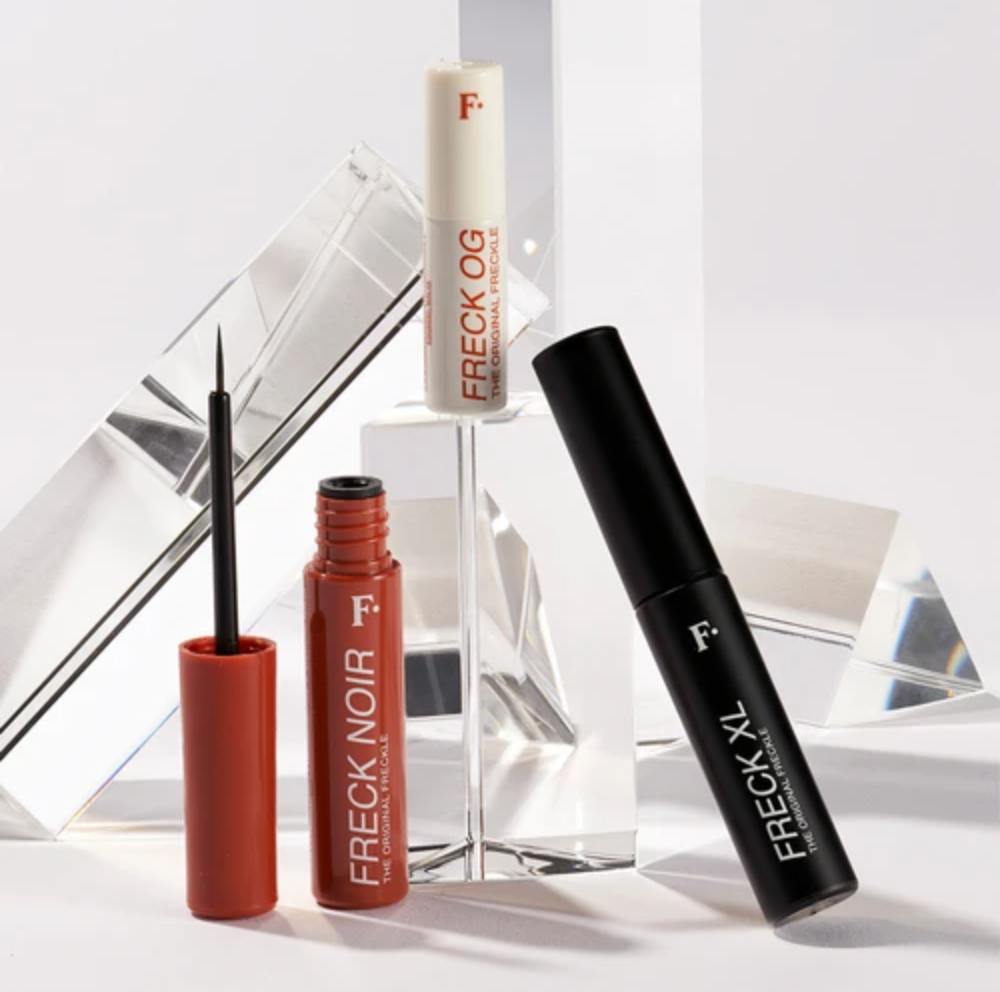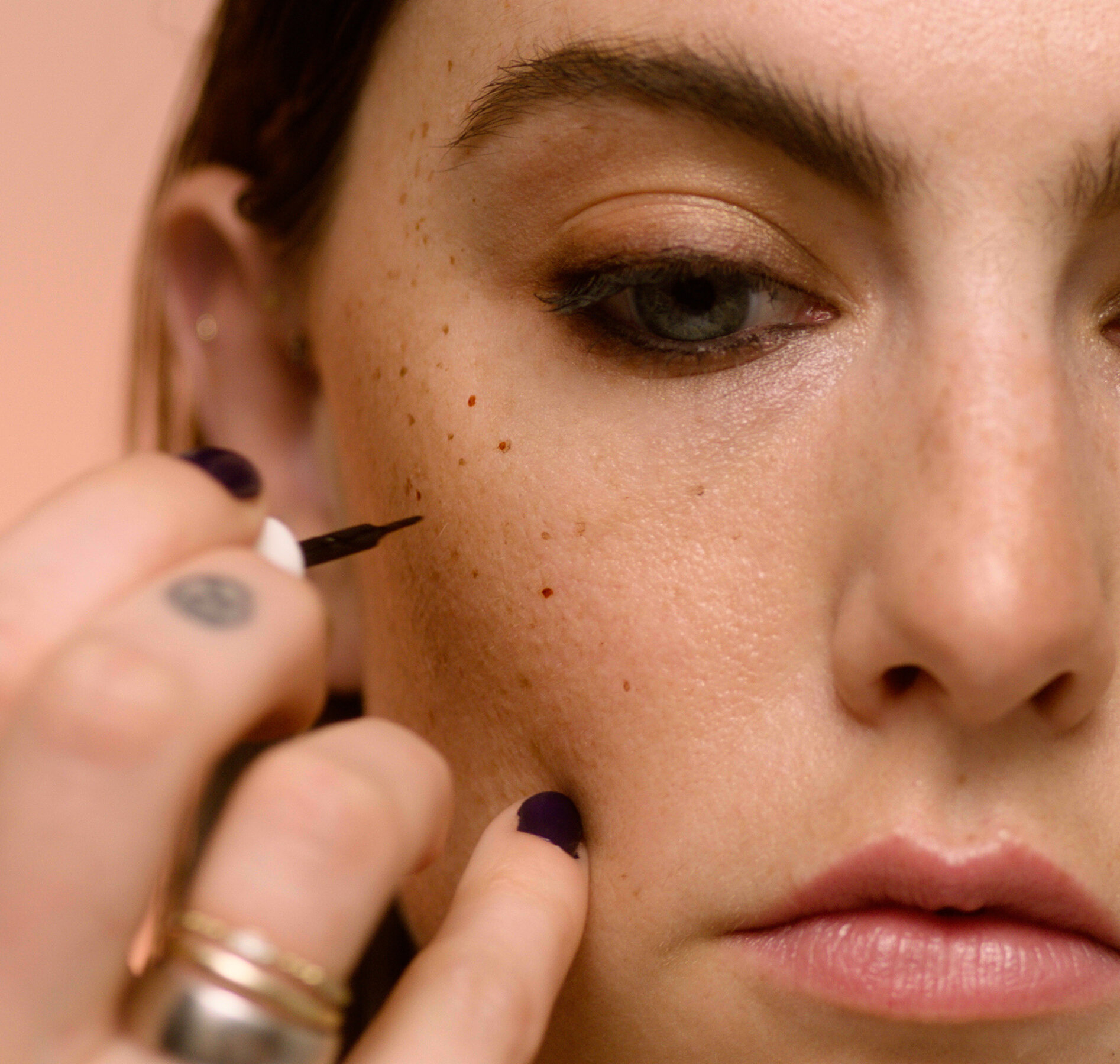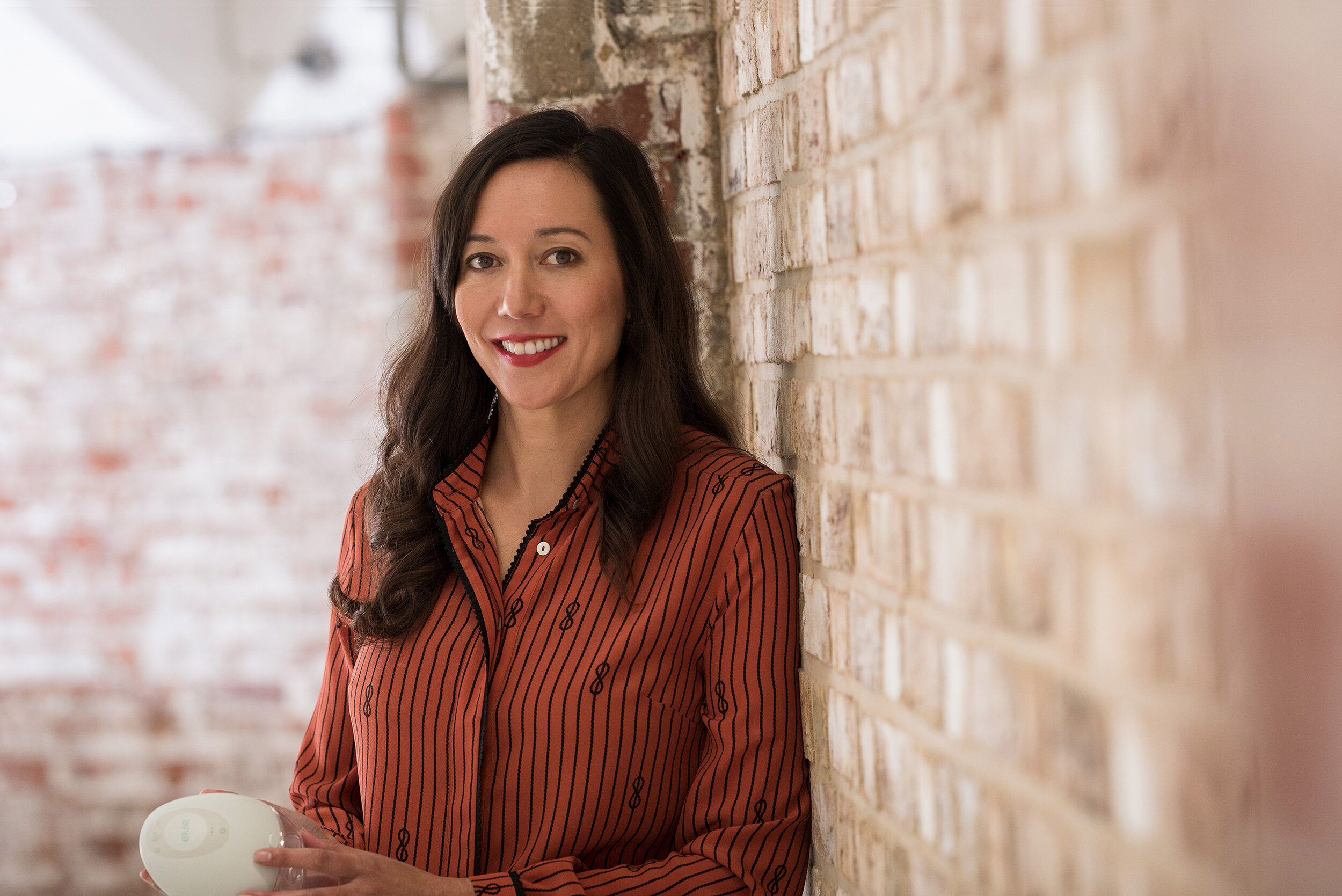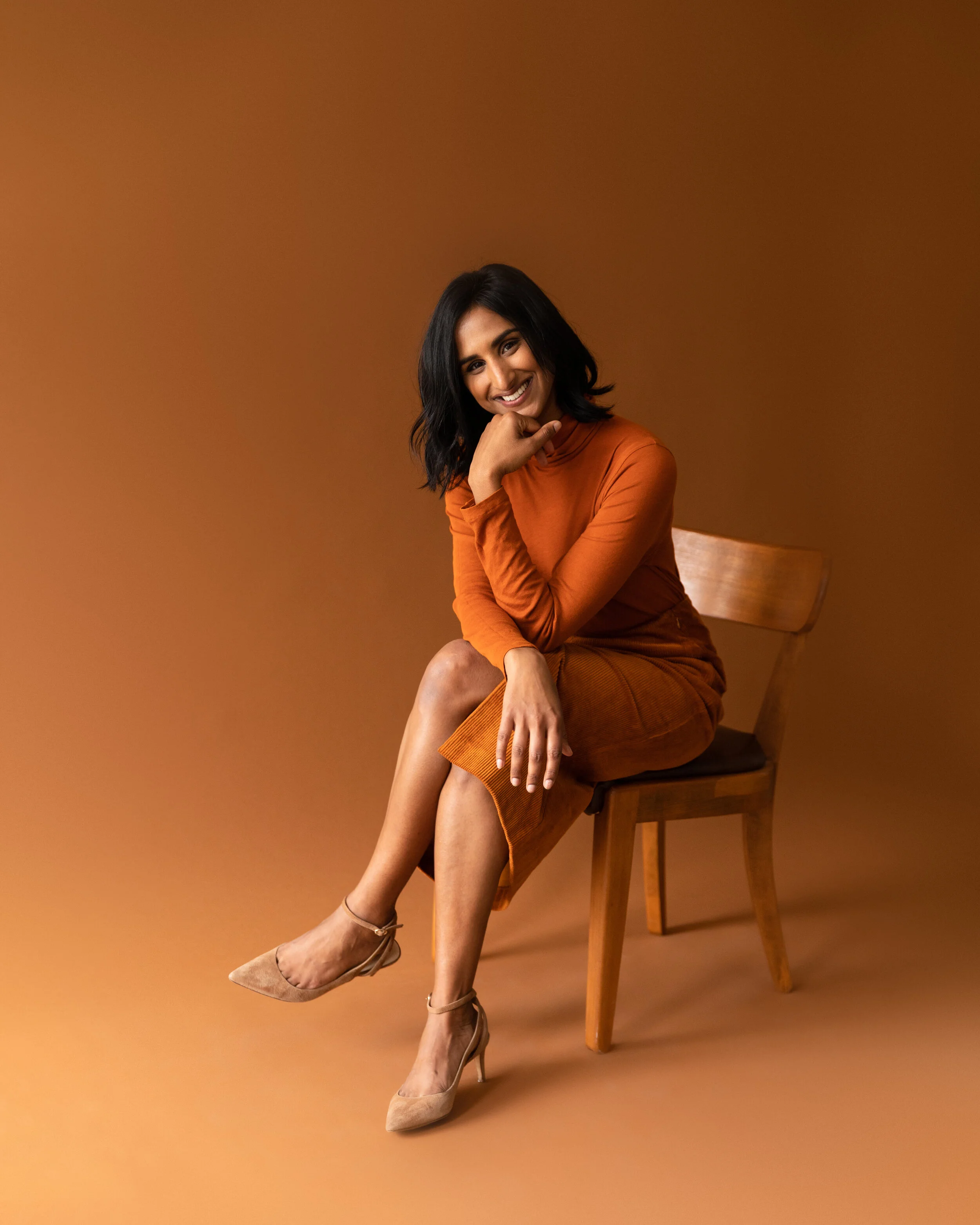We know how daunting it can be to start a new business, especially if you’re disrupting an industry or creating an entirely new one. When there is no path to follow, the biggest question is, where do I start? There is so much to do, but before you get ahead of yourself, let’s start at the beginning. To kick-start the process, and ease some of those first-time founder nerves, we’re asking successful entrepreneurs to share their stories in our new series, From Scratch. But this isn’t your typical day in the life profile. We’re getting into the nitty-gritty details—from writing a business plan (or not) to sourcing manufacturers and how much they pay themselves—we’re not holding back.
Photo: Courtesy of Freck Beauty
About Remi, Founder + CEO of Freck Beauty
Remi is a design-loving, music-obsessed business owner and cat mom to Enzo in Echo Park, Los Angeles. Having grown up in cold and rainy Seattle, Remi was always obsessed with freckles, at a time when it seemed like everyone was trying to get rid of theirs. She started her career as an interior designer, but the idea of a freckle cosmetic was always lingering in the back of her mind. After attending college for branding and marketing, the idea for Freck Beauty’s rule-breaking brand voice and design-forward packaging began to take shape.
She later moved to LA, and after a couple of career changes and attempts at starting her own business, Remi launched Freck Beauty in 2017 with a hero product, FRECK OG – the world’s first freckle cosmetic. Since then, alongside her business partner and COO Des Wilson, Remi has expanded the brand into both skincare and color cosmetics, creating bold, clean beauty products for anyone who cares about ingredients, respects the process, and doesn't care about the rules.
Take us back to the beginning—what was the lightbulb moment for your business?
My background is interior design, and I never thought I would be in beauty. The path to launching Freck Beauty was really formed from a lifelong obsession with freckles. I’ve always wanted to be able to put on freckles since I don’t have any of my own (even though everyone thought I was crazy since this was a time where people wanted to cover and hide their freckles!).
If ever there was a lightbulb moment, it was when I met my first mentor who had decades of experience in cosmetic manufacturing. She was the first person to say “this is actually a really interesting idea,” and her support gave me the confidence to start trying to put the puzzle pieces together on how I would actually formulate a cosmetic.
Did you write a business plan? If yes, was it helpful? If no, what did you use instead? Why did you take that approach?
Hell no. I mean, I definitely tried because everyone told me to, but it was so daunting that I found myself just doing the steps before writing them down. Sometimes it’s best to just dive in. Even now with my business partner, Des, we prefer to organize with bullet points, cocktail napkins, voice memos, Google sheets, pretty much anything informal. We tend to spend our time executing rather than organizing; not ideal, but that shit’s real.
How did you come up with the name Freck Beauty, and what are some of the things you considered during that process? What advice can you share?
All of our products have cheeky names, but Freck Beauty is obviously derived from “freckles.” Most people don’t know this, but I had a ton of name revisions from the Kickstarter days to now: Go Freck Yourself (yikes, so agro); Freck Yourself (still agro); Get Frecked (too confusing to brand); Freck (confusion around our hero product name); and, finally, Freck Beauty. Whenever friends or colleagues are running names by me I always ask, “Can you visualize it on a billboard?” I knew Freck Beauty was the right and final name when I thought about it on a billboard over Sunset Boulevard in Echo Park where I live. Simplicity is key, I think.
What were the immediate things you had to take care of to set up the business, and what would you recommend to new founders reading this?
I think it’s really easy to get wrapped up in the housekeeping of a business early on. While that’s important, it’s not the point, and anyone can set up the housekeeping. Really invest the time figuring out your WHY because it's nearly impossible to stay focused, unique, and positioned without it.
What research did you do for the brand beforehand, and can you explain how you found and compiled that research?
I wanted to manufacture a perfect freckle cosmetic for myself and my friends, but before I dove into Kickstarter, I decided to run a Google Survey. It was a minuscule sample size, but I was able to ask 500 beauty-loving strangers a couple of key yes-or-no questions in 2015 like, “Do you think freckles are desirable?” and, “Would you apply freckles if you could?” This really shaped the way I approached the brand, knowing that I wasn’t alone in wanting freckles.
How did you find the manufacturer or production facility you use, and what advice do you have for other founders looking for a trustworthy manufacturer?
In the case of cosmetic manufacturing, date your labs. Super time consuming, but I would recommend meeting with all the small-run vendors you find from referrals (or Google if you don’t have referrals). Small production runs are barely profitable for labs, so you almost need to sell them on yourself and your concept, because they’re taking on a risk, too—hoping that doing small runs for you will lead to bigger runs. Go into your meetings as your best self, excited about your project, and talk to the lab like they are a potential investor.
How have you funded your business? What advice would you give to aspiring entrepreneurs reading this?
The short story is that I raised a TINY round, bought back those investors after nine months, and didn’t take money again until a pre-seed round in 2019. It was a horrible initial experience. If you’re going to raise money, just make sure that you know and trust your early investors. After that, Des and I basically grew the business by using small private loans. It was ridiculously expensive, but it allowed us to retain equity as long as possible until we were really ready to fundraise.
Do you pay yourself, and if so, how did you know what to pay yourself?
Nada. Des and I both had multiple full-time jobs to pay ourselves (and any hiccups Freck faced) until about two years in. Not only was it not an option to pay ourselves, but we wanted to reinvest into the company by hiring the initial team and expanding our product line. Beyond the money though, I think it’s really important to keep a day job in the early days so you’re not putting too much pressure on the concept or yourself. Starting a business is hard AF without the added stress of having to also make rent every month. Plus, if you find the time to keep motivated after your day job, you know you’re really invested in your idea.
How big is your team now, and what has the hiring process been like?
We have eight employees now and had just one 18 months ago, which has been a huge learning curve. I didn’t have hiring experience, but I did get to talk with interior designer Amber Lewis at Create & Cultivate Los Angeles and she gave some advice that I’ve never forgotten. I asked her, “When did you know you were ready to hire?” She said, “You just know, but when you’re there, put everything into training them. You’ll be working three times as hard, but you can’t expect someone to think like you if you don’t spend the time.” That’s the real truth.
What has been the biggest learning curve during the process of establishing a business? What mistakes have you made?
Without a doubt, the hardest part has been hiring, letting go, and trusting. In the past, we’ve hired people because we’ve been so overwhelmed and just needed someone. No matter how overwhelmed you are, it takes more time to train a position multiple times. Hold out for the right candidate who you fully believe in, who you’re excited to talk shop with, and who can teach YOU about their specialty. That’s where the most innovative ideas come from.
How did you promote your company? How did you get people to know who you are and create buzz? What challenges have you faced?
I almost completely gave up on Freck OG a year after launch because I couldn’t figure out how to get the product in front of people I knew would love it. I didn’t have the confidence to reach out to influencers and beauty bloggers at the time, and when I finally just bit the bullet everyone I spoke to was really curious about the product and open to receiving samples. I think just throw spaghetti until something sticks! And don’t be scared to try different marketing avenues until you find something that works for your brand. That being said, if you can find a CMO to be your business partner or co-founder early on, that’s a killer move that will only speed up your growth.
For those who haven’t started a business (or are about to), what advice do you have?
I love this question. I have a good friend who told me (after the Kickstarter failed and I was trying to figure out a way to market with my embarrassed tail between my legs) that I have “stick-to-itiveness.” That’s always stayed with me. Know that there are going to be so many ups and downs. Take it all in and feel it all. Looking back those are my favorite memories, and I’m so glad I and the team were able to overcome all the obstacles that we learned so much from.
What is your number one piece of financial advice for any new business owner and why?
It’s all about leverage. Keep as much equity as possible, for as long as you can.
If you could go back to the beginning with the knowledge you have now, what advice would you give yourself and why?
If I could go back, I’d ask myself to listen to and trust my voice and point of view more. Don’t worry about following what other people are doing in your industry. The best concepts are ones that no one has come up with yet. Secondly, you can’t do everything yourself. Find amazing, experienced partners who can fill your weaknesses and are ready to sweat it out with you. Des essentially took a percentage of nothing with the vision that we could grow Freck together.
As a co-founder, how have you developed a good working relationship with your business partner? What tips can you share?
Des and I have a really unique partnership in that we have basically no boundaries. We’re best friends, business partners, co-managers. I’m her son’s godmother, and she’s the first person I call to bitch about my ex or neighbors with. We have literally no secrets. Once I helped her get her Diva Cup out. Idk, it just works for us. But doing some serious soul searching before you decide on a partner is key. If you know you need separation from work and boundaries, do you.
Anything else you’d like to add?
In the early days, I thought it would be out of this world insane if Freck Beauty ever made it to Sephora as the world’s first freckle cosmetic. It’s been my absolute dream since day one. We’re launching online on March 2nd and in stores on April 9th, and it’s a pipe dream come true! It’s been a wild and wonderful ride of so much growth and development. If you can see it on a billboard (or on a Sephora shelf) keep it up, you’re onto something big.













































Missed out on Gina Bianchini’s incredible session from our Offsite? No worries! We’re sharing her insights on building a thriving community that feels like a real network, not just an audience.